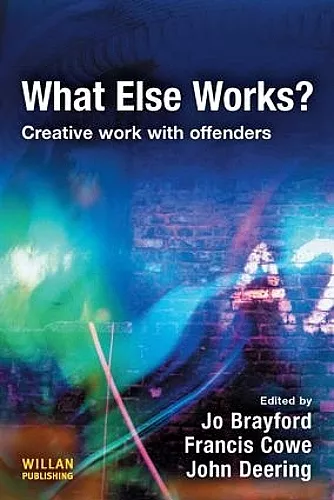What Else Works?
Creative Work with Offenders
John Deering editor Jo Brayford editor Francis B Cowe editor
Format:Paperback
Publisher:Taylor & Francis Ltd
Published:1st Feb '10
Currently unavailable, and unfortunately no date known when it will be back
This paperback is available in another edition too:
- Hardback£145.00was £145.00(9781843927679)

What Else Works? has developed out of a growing awareness amongst practitioners that centralized notions of what works and ‘one size fits all’ approaches to work with offenders and other groups is inevitably limited in its scope and effectiveness.
The book seeks to dispel the view of probation service users as 'offenders', and socially excluded people as 'problems' to be managed and treated, and instead considers more creative alternatives to reduce both re-offending and social exclusion. These include working separately with women, black and minority ethnic groups, local community-focussed projects, in education and nature and conservation programmes. The reader is encouraged to think about past and current policy, practice, and the relationship between practitioners and offenders or other socially excluded people. Questions are raised as to whether, and how, practice could be different and contributors explore the theme of creative and change-focussed practice or focus on a particular approach to a practice.
This book will appeal to students on criminal justice, criminology and social work courses, professionals operating in these fields as well as the wider audience of professionals and academics who may engage with these ‘service users’ from a range of policy and practice perspectives.
'This edited volume provides a thoughtful antidote to fears of an 'over-reliance on cognitive behaviourism as a theory of intervention and group work as a system of deliver' (p. 3) within work with offenders. The editors are forceful in their assertion that the 'What Works' agenda has 'led to the exclusion of other theories and forms of intervention and the downplaying of the relationship between the supervisor and supervised' (p. 3), although they avoid being dogmatic in their approach.
This volume has a lot to offer for a range of people and I would strongly recommend it to practitioners in any area of criminal justice, academics and, perhaps most wholeheartedly, policy makers interested in implementing more relational, inclusive and reflexive offender-focused practice.' - Jake Phillips, PhD Candidate, Institute of Criminology, University of Cambridge
ISBN: 9781843927662
Dimensions: unknown
Weight: 560g
304 pages